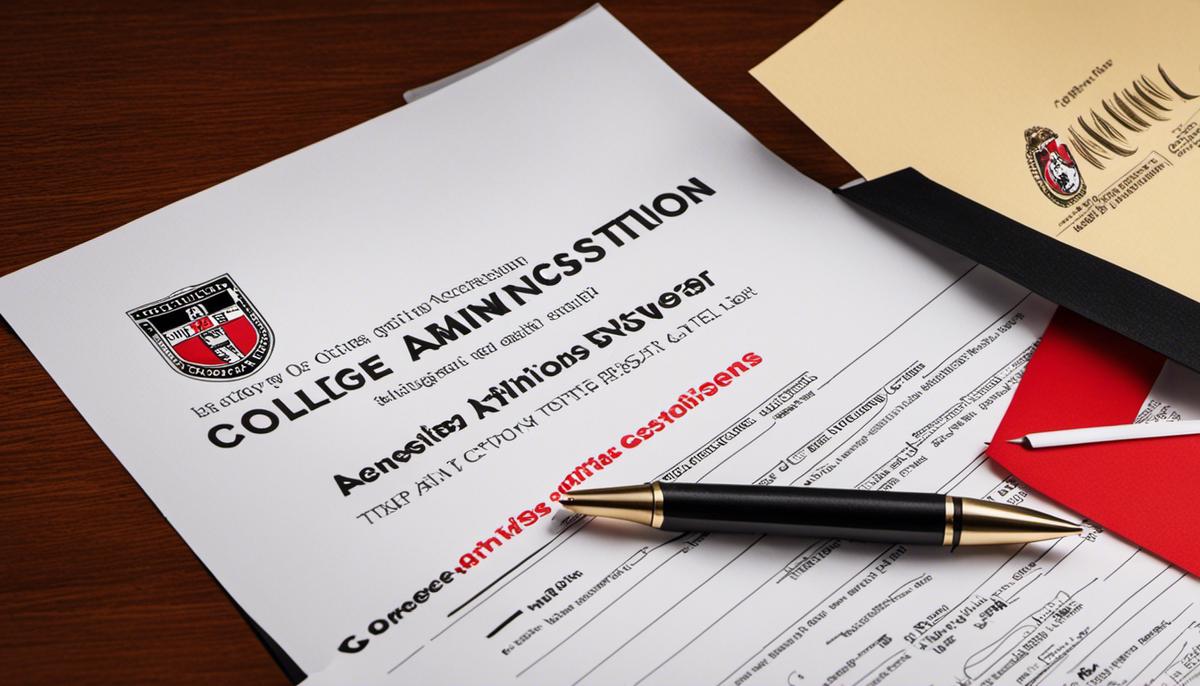Entering the challenging world of college applications can be a daunting experience, with students striving to fulfill their academic ambitions and aspirations. This process, however, can sometimes lead to unexpected turns, including college rejections that stir disappointment and a sense of failure. It’s essential to understand the complexities of the college admissions process, to develop emotional resilience, and to plan strategic steps in response to these situations. Our journey together in this piece will shed light on the nature of college admissions, help develop coping mechanisms to address the emotional impact of rejection, and outline alternative pathways to success in the face of adversity.
Understanding College Admissions Process
Understanding the College Admissions Process
College applications are evaluated based on a host of factors including grades, standardized test scores, coursework difficulty, recommendations, activities, and personal essays among others. Each college has specific criteria that they value most, and they often look for different types of students to contribute to the diversity of their institution. The competition is often high, with some schools admitting less than 10% of their applicants.
Acceptance Rates and Their Implications
Acceptance rates can vary significantly from one institution to another. Highly competitive universities often have lower acceptance rates, reflecting the high number of applications these institutions receive compared to the small number of spots available for enrollment. However, it’s crucial to remember that a rejection is not a personal failure. Instead, it can be seen as the result of a highly competitive environment. The rejection could be due to the institution’s aim for a balanced and diverse incoming class rather than your individual inadequacy.
Understanding Common Reasons for Rejections
Common reasons for rejection can include: academic performance that does not meet the college’s standards, lack of demonstrable interest or commitment to the institution and its offerings, or simply the limitation in the number of students a given institution can admit. The college admissions process is complex and takes into consideration a broad spectrum of factors beyond just academics. Therefore, it’s beneficial to be well-rounded and show sincere interest in the university on your application.
Perspectives on Rejections
Approximately, two-thirds of college applicants are rejected from their top choice college every year. While rejections can feel personally devastating, they are an inevitable part of the college application process. Instead of seeing these as failures, treating them as opportunities for personal growth and resilience can prove beneficial. Recognize that rejections do not define your value or predict your future success, and that there are many paths to a successful and fulfilling career.
The Proportion of Rejected Applicants
The number of rejected applicants is generally high, particularly at the more selective institutions. It’s helpful to remember that many applicants do not get into their top choice school but still manage to find a college that suits their needs and supports their development and career aspirations. The goal is not just to get into a college but to find a school where you will thrive and be successful.

Emotional Management and Coping Mechanisms
Understanding College Application Rejections
Dealing with college application rejections can be distressing and emotionally debilitating. It’s essential to note that you are not the only one experiencing this feeling. Reach out and share your emotions with someone you trust. This could be a friend, a family member, or a mentor. They can provide you with different perspectives and remind you that experiencing setbacks is part of the larger road to success.
Utilizing Emotional Intelligence
Emotional intelligence is your ability to recognize, understand and manage both your emotions and the feelings of others. Practice emotional intelligence by acknowledging your disappointment towards the rejection, but also understanding that it does not define you or your future. You’re allowed to grieve over your lost opportunity, but it’s crucial to remember that there will be many more opportunities and that a rejection does not say anything about your worth or abilities.
Coping with Rejection through Relaxation Activities
Engaging in relaxation activities is an excellent method to cope with rejection. This could include practicing yoga, meditation, exercising, reading or anything else that helps you de-stress. Doing so aligns your emotional and physical wellbeing and can help you foster resilience to setbacks. These activities are a healthy escape and provide a sense of inner peace and calmness, enabling you to come back stronger from a setback.
Focusing on the Positives
Even amidst disappointments such as a college rejection, it’s essential to maintain a positive attitude. Although it might be difficult, try to view rejections as opportunities for growth and learning. There is always something beneficial to be gained from every experience, even those that seem negative at first. A rejection can provide a fresh perspective and may open doors to other opportunities you may not have considered.
The Five Stages of Grief
In dealing with college rejections, you may find yourself traversing the five stages of grief: denial, anger, bargaining, depression, and acceptance. This journey is not linear, so you might oscillate between different stages before reaching the final stage of acceptance. It’s crucial during this time to give yourself grace and space, allowing yourself to feel and process your emotions fully.
Coping Strategies and Building Resilience
Building resilience to setbacks, like college rejections, is a skill that grows over time. As part of this process, establish a strong support network of friends, family, and mentors. Also, set aside dedicated time to engage in activities you enjoy- these pursuits can provide a welcome distraction and can help improve mood and mindset. Finally, don’t be afraid to reach out to a mental health professional if you’re struggling. They can provide strategies and resources to help you better navigate this challenging time.
Moving Forward from College Rejection
Moving forward from a college rejection involves viewing the situation objectively and planning your next steps. Reflect on why you may have been rejected and what you can improve in future applications. Remember that this rejection is just a single moment in time and does not determine your future. You have plenty of chances ahead of you, and each has the potential for success.

Planning Next Steps
Reassess and Reapply
College rejections can be emotionally challenging but are not the end of the line. Take time to reassess your applications. Evaluate if you met the eligibility criteria for the colleges you applied to, if your essay displayed your best traits and ambitions, and if your letters of recommendation were compelling. Gain feedback where you can, and use this as a learning platform for future applications. It might be beneficial to work with a college advisor or counselor for a better understanding of the requirements and expectations at your preferred institutions.
Considering Community College
One alternative option after a college rejection is enrolling in a community college. Community colleges typically have open admissions policies, meaning they will admit any high school graduate. Community colleges offer the chance to improve your academic record, and many have direct transfer programs to four-year institutions. This path can often be more affordable, providing an excellent opportunity to save money while still working towards your goals.
Taking a Gap Year
If you’re unsure of your future career aspirations, use this rejection as an opportunity to focus on personal development by taking a gap year. A gap year could entail working, traveling, volunteering, or pursuing a particular interest. This time can provide a fresh perspective, mature your outlook, increase self-reliance, and perhaps even furnish your college application with diverse experiences and a renewed enthusiasm for continuing your education.
Considering Vocational or Alternative Career Pathways
Not every career requires a traditional four-year degree. In fact, the demand for vocational and trade skills is continuously growing in the construction, healthcare, and technology sectors. You might find that a technical, vocational, or trade school is a better fit for your career goals. These programs tend to be more hand-on and more directly job-oriented, focusing on training for specific career fields.
Exploring Online Learning Platforms
There are many online education platforms like Coursera, Skillshare, or Khan Academy that offer courses across a broad range of fields. These could help you learn new skills, discover potential interests, and build a strong knowledge base in your area of interest. Some platforms offer university-level courses with accreditation, meaning you can still receive legitimate qualifications outside of traditional college enrollment.
Navigating college rejections can be disappointing, but remember that it is not a measure of your worth or potential. There are many paths to personal and professional success, and you can turn this moment into a significant turning point towards a successful future. By exploring the options presented above, you can find the right path for you.

Experiencing college application rejections can feel disappointing and overwhelming, but it’s far from the end of the line. It’s not a personal failure but rather an indication of the competitiveness of modern higher education. Remember, your value is not solely defined by an acceptance letter from a prestigious institution. By exploring your emotional reactions, developing coping strategies, and considering a proliferation of alternatives—from taking a gap year to exploring vocational routes—you’re preparing not only to transcend this challenge, but to foster resilience and adaptability, skills vital to your future success. The door to your dreams isn’t closed; sometimes, rejection just leads us to a different doorway, waiting and inviting with opportunities yet to be discovered.
